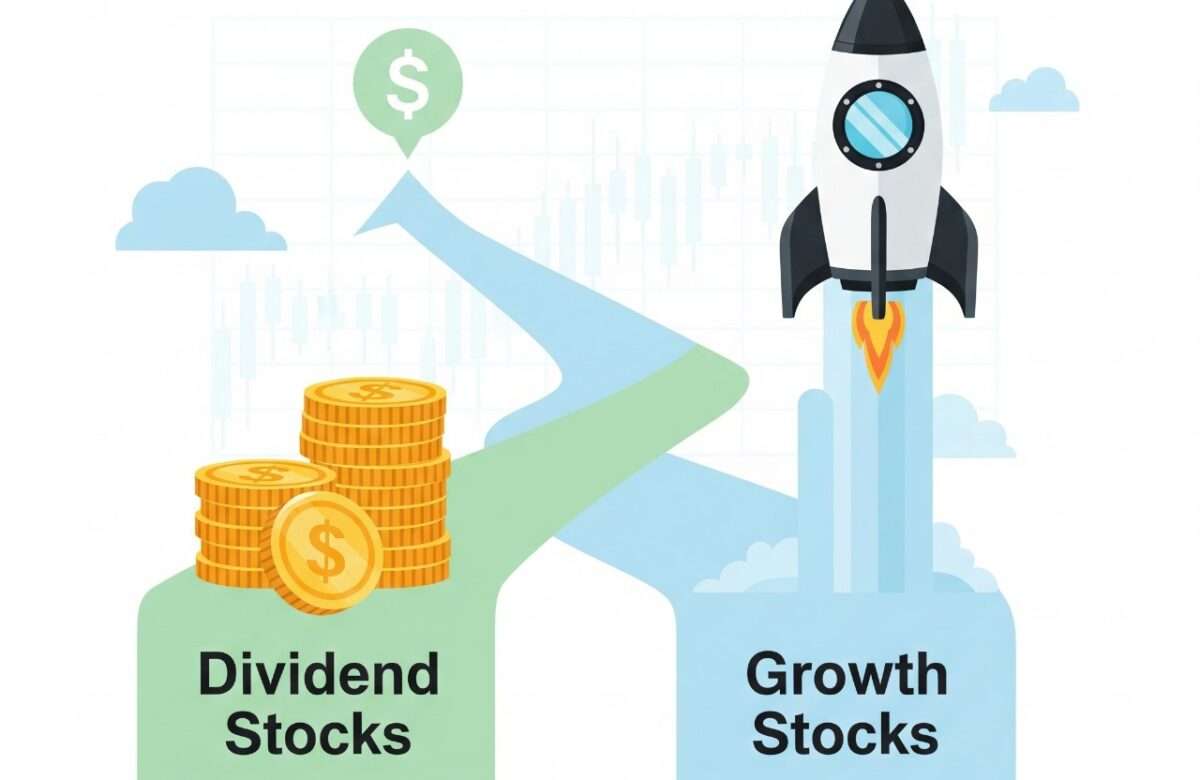- 28 November 2024
- No Comment
- 1175
A Beginner’s Guide on Stock Exchange & Insights on Pakistan Stock Exchange

Imagine a bustling marketplace, not of fruits or spices but of opportunities, where dreams of growth meet the power of investment. This is the stock exchange, the heartbeat of any economy. It’s a dynamic arena where businesses seeking fuel for their ambitions connect with individuals and institutions ready to grow their wealth. Here, every trade tells a story: of companies striving to expand and investors betting on a brighter tomorrow. The stock exchange isn’t just a marketplace; it’s the engine driving innovation, progress, and economic vitality.
What is a Stock Exchange?
Think of the stock exchange as a big, organized marketplace for investments. It’s where people buy and sell shares of companies, bonds, and other financial products. A stock exchange is carefully regulated to ensure everything runs smoothly, fairly, and transparently, so investors feel confident their money is in good hands.
How Does the Stock Exchange Work?
Let’s break it down step by step:
- Companies Offer Shares: When a company needs money to grow, it can sell small ownership pieces, called shares, to the public through a process called an Initial Public Offering (IPO).
- Investors Trade Shares: Once the company’s shares are listed, people can buy and sell them on the stock exchange.
- Prices Move with the Market: Share prices go up or down depending on demand and supply, how well the company is doing, overall economic conditions, and even how optimistic or cautious investors feel.
Why is the Stock Exchange Important?
- Boosts Economic Growth: It helps companies raise money for innovation and expansion, which benefits the entire economy.
- Creates Wealth: Investors, whether individuals or big institutions, can grow their savings by buying shares that increase in value or earn dividends.
- A Barometer for the Economy: The stock market reflects a country’s economic health. When the market is strong, it often means the economy is doing well, and vice versa.
Common Terms in the Stock Market
- Index: This is like a report card for the market. For example, the S&P 500 tracks the performance of the 500 biggest U.S. companies.
- Bull Market: When the stock market is doing great and prices are rising. Think of a bull charging upward!
- Bear Market: When prices are falling, signalling a rough time in the market. Picture a bear swiping downward with its paw.
- Dividend: Companies often share a part of their profits with investors as a “thank you” for holding their shares.
- Blue-Chip Stocks: These are shares of large, reliable companies that have been around for a long time, like the “A-students” of the market.
By understanding these basics, anyone can begin their journey into the world of investing!
Top Stock Exchanges in the World
- New York Stock Exchange (NYSE): The largest stock exchange globally, located in the U.S.
- NASDAQ: Known for its focus on technology companies.
- London Stock Exchange (LSE): A leading exchange in Europe.
- Tokyo Stock Exchange (TSE): The main stock exchange in Japan.
- Shanghai Stock Exchange (SSE): A key player in Asia.
- Indian Stock Exchange (NSE): Ranked as the fourth largest market in the world
How to Invest in the Stock Market
Investing in the stock market is more accessible than ever, no matter where you live. Here’s a straightforward guide to help you start your journey:
1. Understand the Basics
Before you invest, it’s important to learn the fundamentals. Get familiar with concepts like stocks (ownership in a company), bonds (loans to companies or governments), mutual funds, and ETFs (Exchange-Traded Funds). Also, understand key terms such as diversification (spreading investments to reduce risk), asset allocation (dividing your investments across different types of assets), and risk tolerance (your comfort level with market fluctuations). There are many free resources available online to help you build this knowledge.
2. Define Your Investment Goals
Think about why you’re investing. Are you saving for retirement, a big purchase, or your children’s education? Your goals will guide your investment choices. For example, long-term goals might allow for riskier investments with higher growth potential, while short-term goals may require safer, more stable options.
3. Evaluate Your Risk Tolerance
Risk tolerance is about how much uncertainty or loss you’re willing to accept. Younger investors often have more time to recover from market downturns and may be able to take on more risk. However, risk is a personal factor—choose an approach that matches your comfort level and financial situation.
4. Open an Investment Account
To invest, you’ll need an account with a brokerage or financial institution. Online brokerage platforms are a popular option, offering user-friendly interfaces and access to global markets. If you’re saving for retirement, look into options specific to your country, like tax-advantaged accounts, retirement funds, or pension schemes.
5. Start with Diversified Investments
For beginners, low-cost index funds or ETFs, are an excellent way to get started. These funds track major market indices, offering diversification and lower fees compared to actively managed funds. They’re also a favourite choice for experienced investors due to their consistent performance over time.
Review on Pakistan Stock Exchange (PSX)
The Pakistan Stock Exchange (PSX) is the heart of Pakistan’s financial market, facilitating the trading of securities and serving as a barometer of the country’s economic health.
Recently, the PSX’s KSE-100 Index surpassed the 100,000-point mark for the first time in history. Over the past two years, the PSX has experienced unprecedented growth. From closing at 62,500 points at the end of last year to gaining 37,000 points within 11 months, this surge is one of the largest single-year increases in Pakistan’s stock market history.

This remarkable achievement is a testament to the resilience and potential of Pakistan’s financial markets, despite facing economic and political challenges over the years. Let’s delve into the current state of the stock market, its drivers, and what this means for the average citizen.
What’s Driving This Historic Growth?
The impressive performance of the PSX can be attributed to several factors:
1. Economic Recovery
Pakistan’s economy, after years of challenges, is showing signs of stabilization. Key economic indicators such as reduced inflation and improved exports have bolstered investor confidence. Economic recovery not only drives stock market performance but also indicates a healthier environment for businesses to thrive.
2. Corporate Earnings
Companies listed on the PSX have shown resilience by transferring inflationary pressures to consumers, leading to higher revenues. For example, industries such as fertilizer, pharmaceuticals, and automotive have reported significant gains. Factors like reduced raw material costs and increased local demand have contributed to these sectors’ success.
3. Interest Rate Cuts
The decline in interest rates has played a pivotal role. Historically, high interest rates deter stock investments as investors prefer safer, fixed-income options. However, as rates dropped, funds flowed from traditional savings instruments and real estate into the stock market, providing a much-needed boost.
4. International Confidence
The International Monetary Fund (IMF) program has restored some faith among international and domestic investors. This confidence is crucial for attracting foreign direct investment and stabilizing financial markets.
What Does This Mean for the Economy?
While the PSX’s growth is a significant achievement, its impact on the broader economy requires a nuanced understanding.
- Positive Indicators for Business: A thriving stock market attracts both local and foreign investments. Businesses see it as an opportunity to raise capital for expansion, driving industrial growth and employment.
- Improved Investor Sentiment: A strong stock market signals stability, which is critical for restoring trust among investors, both domestic and international.
However, it’s essential to note that only a small percentage of Pakistan’s population directly participates in the stock market. With around 350,000 active investors in a country of over 250 million people, the benefits are not immediately visible to the average citizen.
Despite these achievements, the stock market’s growth doesn’t necessarily reflect the financial reality of ordinary Pakistanis. Rising incomes for corporations don’t always translate to reduced financial burdens for the public. However, the economic improvements driving the PSX, such as inflation control and export growth, indirectly benefit the population by creating jobs and stabilizing the economy.
Another challenge is expanding the investor base. Financial literacy and access to the stock market need to improve to ensure that more citizens can benefit from this economic progress.
Impact on Everyday Pakistanis
While a booming stock market directly benefits investors, its indirect effects can positively impact the broader population:
- Job Creation: Economic growth and corporate expansion lead to more employment opportunities.
- Price Stability: Reduced inflation can ease the cost of living for ordinary citizens.
The PSX’s performance is a promising indicator of Pakistan’s economic recovery. However, sustaining this momentum will require consistent government policies, infrastructure development, and increased financial literacy among the public to expand the investor base.
By understanding the fundamentals of stock exchanges and examining the current trends in the PSX, readers can gain valuable insights into how financial markets operate and the potential benefits they bring to a nation’s economy. For those considering investing, now might be an excellent time to explore opportunities in the PSX, keeping in mind the importance of research and prudent decision-making.
 Investing in the stock market can seem overwhelming, but you don’t have to navigate it alone. With the right guidance and expertise, you can make smart investment choices that align with your financial goals, whether it’s building wealth, saving for retirement, or achieving early retirement. At Fire Up Club, we specialize in helping individuals take control of their financial future.
Investing in the stock market can seem overwhelming, but you don’t have to navigate it alone. With the right guidance and expertise, you can make smart investment choices that align with your financial goals, whether it’s building wealth, saving for retirement, or achieving early retirement. At Fire Up Club, we specialize in helping individuals take control of their financial future.
Led by Nabeil Schaik, a seasoned chartered accountant, investment banker, and serial entrepreneur with over 18 years of experience across the UK, GCC, and Pakistan, Fire Up Club has empowered countless entrepreneurs to invest wisely and secure their financial independence. As a highly skilled portfolio manager and wealth advisor, Nabeil has helped individuals grow their wealth, plan for retirement, and even retire early through strategic investment planning.
Ready to take the first step towards your financial freedom? Let Fire Up Club guide you on your journey. Reach out to us today and see how we can help you achieve your financial dreams!




